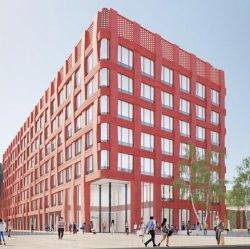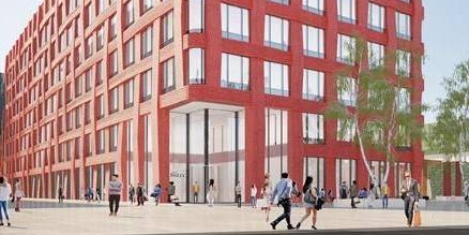March 29, 2018
HMRC signs for Manchester HQ as part of nationwide programme of lettings
 HMRC has completed a 25 year letting of 157,153 sq ft at the English Cities Fund’s New Bailey development in Greater Manchester. HMRC will take over the whole of the seven storey 3 New Bailey development with staff moving in from 2022. The move is part of a nationwide programme of lettings in major cities to deliver HMRC services at local level, overseen by the Government Property Unit. There have already been announcement of new HMRC hubs in Cardiff, Edinburgh, Leeds and Birmingham. The New Bailey move will form the initial phase of the HMRC Manchester Regional Centre. Additional capacity for around 2,500 staff working in the city will be retained at Trinity Bridge House as a transitional site until 2027/8, when the second phase of the regional centre is expected to open. (more…)
HMRC has completed a 25 year letting of 157,153 sq ft at the English Cities Fund’s New Bailey development in Greater Manchester. HMRC will take over the whole of the seven storey 3 New Bailey development with staff moving in from 2022. The move is part of a nationwide programme of lettings in major cities to deliver HMRC services at local level, overseen by the Government Property Unit. There have already been announcement of new HMRC hubs in Cardiff, Edinburgh, Leeds and Birmingham. The New Bailey move will form the initial phase of the HMRC Manchester Regional Centre. Additional capacity for around 2,500 staff working in the city will be retained at Trinity Bridge House as a transitional site until 2027/8, when the second phase of the regional centre is expected to open. (more…)











 It should come as little surprise that graduates who have undertaken an internship are more likely to have honed the skills businesses needs, one of the main findings of the Institute of Student Employers (ISE) annual Development Survey, which launches today (28 March 2018) at the ISE Student Development Conference. The report found that 63 percent of employers believed graduates who had undertaken work experience had the required soft skills, yet less than half (48 percent) thought this of graduates in general. According to the report the five most common graduate skills gaps are; managing up (5 percent of employers believed graduates had this skill); dealing with conflict (12 percent); negotiating/influencing (17 percent); commercial awareness (23 percent and resilience (31 percent). This is why closing skills gaps is a priority for businesses with 74 percent of employers taking specific actions to tackle the issue in 2017. Changes to recruitment and on-the-job training were the most common actions and 16 percent of organisations improved their internship development programmes specifically to close skills gaps.
It should come as little surprise that graduates who have undertaken an internship are more likely to have honed the skills businesses needs, one of the main findings of the Institute of Student Employers (ISE) annual Development Survey, which launches today (28 March 2018) at the ISE Student Development Conference. The report found that 63 percent of employers believed graduates who had undertaken work experience had the required soft skills, yet less than half (48 percent) thought this of graduates in general. According to the report the five most common graduate skills gaps are; managing up (5 percent of employers believed graduates had this skill); dealing with conflict (12 percent); negotiating/influencing (17 percent); commercial awareness (23 percent and resilience (31 percent). This is why closing skills gaps is a priority for businesses with 74 percent of employers taking specific actions to tackle the issue in 2017. Changes to recruitment and on-the-job training were the most common actions and 16 percent of organisations improved their internship development programmes specifically to close skills gaps.
 Over a fifth (21 percent) of 18-24 year olds admit that they have rejected a potential employer because of the poor design of the office or lack of amenities available, while 34 percent in the same age group would be willing to commute for a maximum of one hour each way to an office that is considered perfect – compared to 22 percent of 45-54 year olds. The research, commissioned by Mindspace, found that 16 percent of 18-24 year olds have actually left a job because of how poorly designed the office was in one of their previous roles. Overall, nearly a third (31 percent), of workers are bored with their current office environment and feel uninspired at work, with 28 percent of workers describing their place of work outdated and dull. The research also found that while most workers had access to amenities such as a kitchen (72 percent), meeting rooms (66 percent) and free tea & coffee (53 percent), what UK office workers desire the most to improve morale is more natural light, air conditioning and improved interior lighting.
Over a fifth (21 percent) of 18-24 year olds admit that they have rejected a potential employer because of the poor design of the office or lack of amenities available, while 34 percent in the same age group would be willing to commute for a maximum of one hour each way to an office that is considered perfect – compared to 22 percent of 45-54 year olds. The research, commissioned by Mindspace, found that 16 percent of 18-24 year olds have actually left a job because of how poorly designed the office was in one of their previous roles. Overall, nearly a third (31 percent), of workers are bored with their current office environment and feel uninspired at work, with 28 percent of workers describing their place of work outdated and dull. The research also found that while most workers had access to amenities such as a kitchen (72 percent), meeting rooms (66 percent) and free tea & coffee (53 percent), what UK office workers desire the most to improve morale is more natural light, air conditioning and improved interior lighting.
 Over a third of workers are adversely affected by a lack of natural light in their office, others complain that the lighting is too bright and a significant proportion say the quality of light provided is so weak they struggle to read. This is according to a new poll which quizzed employees about the difficulties associated with workplace lighting and found that headaches and dizziness were a problem for one in seven. Other employees reported finding the lighting too bright and dazzling (12.4 percent), while one in 10 said they had to strain their eyes due to a general lack of light. A similar proportion said they were bothered by the position of the lights and by the ‘stressful environment’ created by their workplace lighting (9.3 percent each). The findings come as reports of ‘sick building syndrome’ — a condition associated with office work that causes symptoms including headaches and respiratory problems — continue to hit the headlines. Such symptoms are usually attributed to unhealthy or stressful elements of the working environment, such as poor ventilation and lighting.
Over a third of workers are adversely affected by a lack of natural light in their office, others complain that the lighting is too bright and a significant proportion say the quality of light provided is so weak they struggle to read. This is according to a new poll which quizzed employees about the difficulties associated with workplace lighting and found that headaches and dizziness were a problem for one in seven. Other employees reported finding the lighting too bright and dazzling (12.4 percent), while one in 10 said they had to strain their eyes due to a general lack of light. A similar proportion said they were bothered by the position of the lights and by the ‘stressful environment’ created by their workplace lighting (9.3 percent each). The findings come as reports of ‘sick building syndrome’ — a condition associated with office work that causes symptoms including headaches and respiratory problems — continue to hit the headlines. Such symptoms are usually attributed to unhealthy or stressful elements of the working environment, such as poor ventilation and lighting.


 The mental health of employees, especially those working within high pressured working environments are the number one concerns for UK CEOs. Nearly three quarters (73 percent) of respondents to the annual wellbeing report ‘
The mental health of employees, especially those working within high pressured working environments are the number one concerns for UK CEOs. Nearly three quarters (73 percent) of respondents to the annual wellbeing report ‘
 There is a disparity between the causes of communications anxiety between men and women, claims new research conducted by RADA in business. Male employees are 45 percent more likely than women to feel anxious when socialising with their work colleagues, while women are most scared of giving a presentation. Team building events were also found to be more challenging for men, with almost a fifth (19 percent) reporting feelings of communications anxiety. Work social events followed, with 17 percent reporting the same feelings. In contrast, the report found that female employees experience greater levels of anxiety when giving presentations in front of a group, to colleagues, or to management. The evidence suggests that while men require more help with skills around spontaneous communication, for women it is about standing their ground and getting their voice heard when stepping into the spotlight – often in situations that may have a significant impact on their career path. Notably, the research shows that women are also 39 percent more likely to experience workplace anxiety than men when in a job interview, and 37 percent more likely when negotiating a pay rise.
There is a disparity between the causes of communications anxiety between men and women, claims new research conducted by RADA in business. Male employees are 45 percent more likely than women to feel anxious when socialising with their work colleagues, while women are most scared of giving a presentation. Team building events were also found to be more challenging for men, with almost a fifth (19 percent) reporting feelings of communications anxiety. Work social events followed, with 17 percent reporting the same feelings. In contrast, the report found that female employees experience greater levels of anxiety when giving presentations in front of a group, to colleagues, or to management. The evidence suggests that while men require more help with skills around spontaneous communication, for women it is about standing their ground and getting their voice heard when stepping into the spotlight – often in situations that may have a significant impact on their career path. Notably, the research shows that women are also 39 percent more likely to experience workplace anxiety than men when in a job interview, and 37 percent more likely when negotiating a pay rise.


 The challenge to achieve gender equality at work isn’t made any easier by the attitudes of some employers. Although men increasingly want to be more present at home, currently fathers are
The challenge to achieve gender equality at work isn’t made any easier by the attitudes of some employers. Although men increasingly want to be more present at home, currently fathers are 









